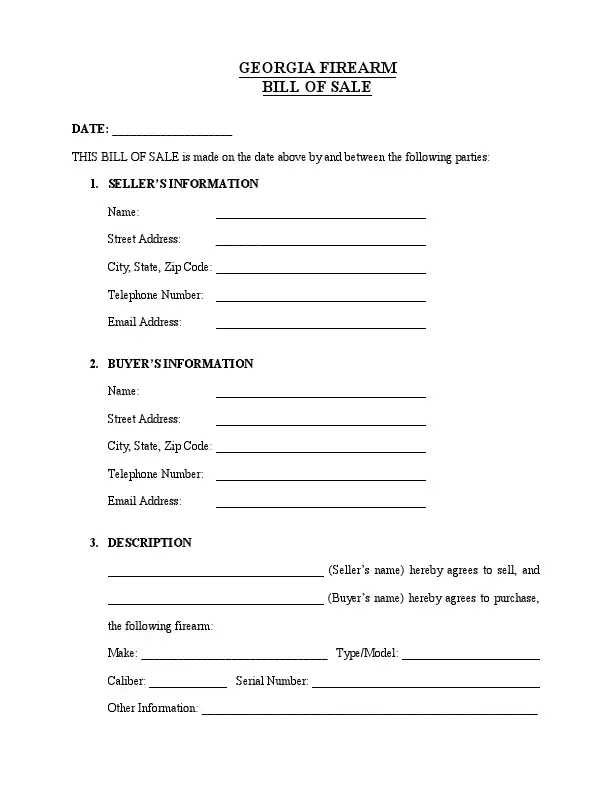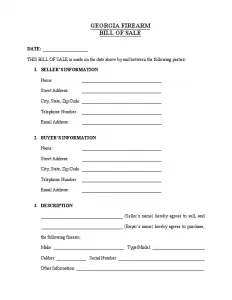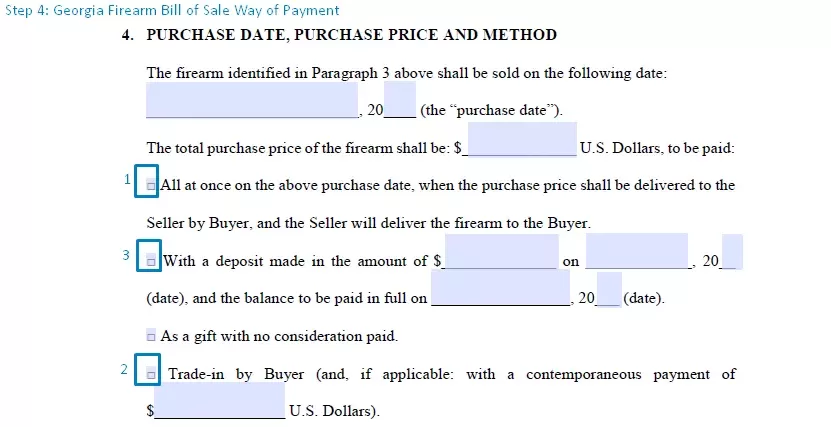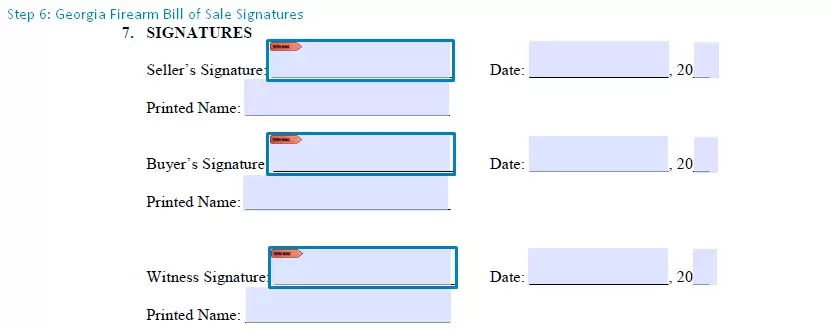Georgia Firearm Bill of Sale Form
A Georgia firearm bill of sale is an essential document that lawfully confirms a legal sale between a buyer and seller. This is a vital document that acts as proof of transfer of ownership at a particular date. When you want to purchase a gun, it is essential to incorporate a bill of sale for protection purposes. Since it has notary confirmation and detailed information of the seller, individuals will not sell an illegal firearm. It cushions both parties from fraudulent activities since the document requires original signatures in the presence of a legal representative.
Since each state has different gun laws regarding the sale of firearms, it is essential to carry out due diligence before purchasing one.
Georgia bill of sale templates – learn more about bills of sale related to different property types in Georgia.

Build Your Document
Answer a few simple questions to make your document in minutes
Save and Print
Save progress and finish on any device, download and print anytime
Sign and Use
Your valid, lawyer-approved document is ready
Registering a Firearm in Georgia
After finalizing the firearm sale, you don’t have to register it since there are no registration laws in Georgia. Each state has different gun laws that govern the buying and selling of firearms. Therefore, it is essential to carry out due diligence before buying a gun from a dealer.
If you are a resident of Georgia and want to buy a firearm from a dealer, you must provide proof of identification – your State ID or driver’s license. The gun dealer must then carry out a thorough background check before selling any firearm. It prevents felons from buying firearms for criminal activities. However, if you opt to buy from an individual, you do not need a license and no background checks will be conducted.
If you want to sell a firearm in Georgia, you don’t have to perform background checks on purchasers. Georgia does not have restrictions on buying and selling guns as long as you do not sell a firearm to a criminal knowingly. It is a crime to sell a gun to a felon and the state can prosecute you. Otherwise, you are free to sell your property to anyone you deem fit.
The most crucial document in a firearm purchase is the bill of sale form. It contains particulars of all parties involved in the transaction, such as buyer, seller, witnesses, and the legal representative. It protects all parties from fraudulent activities and dishonest sellers who may want to sell illegal firearms to unsuspecting individuals. It contains the evidence of sale and the transfer of ownership from one gun holder to another, without any state laws regarding the sale.
Apart from the bill of sale, no other documents are required to finalize the sale since Georgia does not have gun registration laws.
Below are the details in the firearm bill of sale, whether you use our firearm bill of sale form or any other template found on the Internet:
- Name and physical address of the buyer and seller
- Driver’s license
- City and state
- Firearm description: make, model, serial number, and caliber
- Purchase price
- Name and signature of the buyer, seller, and witnesses
- Notary public information
After finalizing the deal, the notary public will imprint a seal on the document to prove its legitimacy. The seller must then issue copies to all the parties involved while the original copy goes to the purchaser.
Georgia Firearm Purchase Details
| Subject | Long Guns | Hand Guns |
| Registration of a Firearm | Not required | Not required |
| Permit to Purchase | Not required | Not required |
| Concealed Weapons Permit Fee | $78.25 ($30 if renewal) | |
| Background Check for Private Sales | Not required | Not required |
| Persons Prohibited from Carrying Firearms | Georgia Code, Section 16-11-131 | |

How to write Georgia Firearm Bill of Sale
The details listed below are based on our custom bill of sale template. We strongly recommend using the local official form if possible.
Step 1: Indicate the bill of sale creation date.

Step 2: Type in the details of all parties (buyer and seller):
- Full name
- Address: Street, City, State of residence, Area code
- Contact information: Phone, Email address

Step 3: Identify the firearm being sold:
- Manufacturer
- Type/Model
- Caliber
- Serial Number
- Other information you deem crucial.

Step 4: At this point, you should indicate the way you will get money for the offer.
Enter the purchase date and specify the full amount that has to be paid for the firearm. Once that is handled, you need to check the way of purchase:
- The whole amount straight away. Nothing complicated here: the buyer pays the entire price in one payment and has the car delivered to them within a day.
- Trade-in. In the event that this particular option is selected, the selling party trades their firearm for the firearm presented by the purchaser. If the buyer’s firearm is lower in value, they’ll have to even that out with an extra payment. You will also have to provide the description of the purchaser’s firearm.
- A number of payments. Using this method, you need to enter the dates when the purchaser must provide the first and the last payments, along with their sums.
After that, select one transaction method:
- Cash
- Check
- Cashier’s check
- Money order
Finally, check if the purchase price includes all applicable taxes.

Step 5: Look at disclosures and miscellaneous provisions.
These generally state that all parties affirm the disclosures necessary for firearm exchange and that the purchaser acquires the object sold in “as-is” condition and is liable for it once the transaction is completed.

Step 6: Place your signature(s) in the appropriate fields.
The purchaser is typically not required to sign the form. Yet, you will end up more protected against legal troubles if all sides sign the form. You may additionally have one or a number of witnesses verify the transaction.

Step 7: Notarize the form
Notarization is usually not needed, but it can be a decent way to introduce another level of legal protection to the deal.
The original document copy has to be given to the buyer because they will require it to receive a title to their newly bought firearm. There are two ways here: you need to either prepare and sign two identical bills of sale or make a duplicate for the seller to have.
